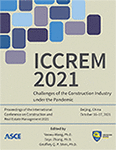Impacts of Energy-Saving Technological Progress in the Building Materials Sectors on Both Economy and Environment of the Construction Industry
Publication: ICCREM 2021
ABSTRACT
The energy-saving technological progress have aroused widespread concern in many industries and will also become an important way to reduce the building embodied carbon emissions. Because building embodied carbon emissions involve the carbon emissions from multiple related sectors, the technological progress in different sectors will have impacts on building embodied carbon emissions. However, there is a lack of systematic research to explore and analyze the correlations of technological progress on building embodied carbon emission reduction in an economic system in which multiple sectors coexist. In this paper, first, a social accounting matrix was compiled that highlight the related sectors; second, a dynamic CGE model of multi-sector energy-saving technologies was built; third, different scenarios on energy-saving scenarios were set up on building embodied carbon emissions; and finally, through simulation and analysis, the differences in the results from economy, industrial structure, energy consumption, and carbon emissions are compared with the benchmark scenarios.
Get full access to this article
View all available purchase options and get full access to this chapter.
REFERENCES
Banerjee, S. (2021). “Carbon adjustment in a consumption-based emission inventory accounting: a CGE analysis and implications for a developing country.” Environmental Science and Pollution Research, (6), 1–18.
Cao, Z., Liu, G., Zhong, S., Dai, H., and Pauliuk, S. (2019). “Integrating dynamic material flow analysis and computable general equilibrium models for both mass and monetary balances in prospective modeling: a case for the Chinese building sector.” Environmental Science & Technology, 53(1), 224–233.
Doroodian, K., and Boyd, R. (2003). “The linkage between oil price shocks and economic growth with inflation in the presence of technological advances: a CGE model.” Energy Policy, 31(10), 989–1006.
Fu, Y., Huang, G., Liu, L., and Zhai, M. (2020). “A factorial CGE model for analyzing the impacts of stepped carbon tax on Chinese economy and carbon emission.” Science of the Total Environment, 759,143512.
Liu, J., Bai, J., Deng, Y., Chen, X., and Liu, X. (2020). “Impact of energy structure on carbon emission and economy of China in the scenario of carbon taxation.” Science of the Total Environment, 762(4), 143093.
Pui, K. L., and Othman, J. (2017). “Economics and environmental implications of fuel efficiency improvement in Malaysia: a computable general equilibrium approach.” Journal of Cleaner Production, 156, 459–469.
Shi, Q., Ren, H., Cai, W., and Gao, J. (2019). “How to set the proper level of carbon tax in the context of Chinese construction sector? A CGE analysis.” Journal of Cleaner Production, 240,117955.
Jung, T. Y., Kim, Y. G., and Moon, J. (2021). “The Impact of demographic changes on CO2 emission profiles: cases of East Asian countries.” Sustainability, 13, 677.
Tang, L., Shi, J., Yu, L., and Bao, Q. (2017). “Economic and environmental influences of coal resource tax in China: a dynamic computable general equilibrium approach.” Resources Conservation & Recycling, 117, 32–44.
Wang, H., Tao, X. M., and Ge, L. (2017). “Study on energy-saving CGE-Model of residential buildings considering energy and environmental impact.” China Population, Resources and Environment, 027, 82–91.
Xiao, H., Xie, R., and Wan, Y. (2012). “Energy-saving technological progress and the construction of two-oriented society in Hunan Province: based on the CGE model of Hunan Province.” Science & Technology Progress and Policy, 29(09), 36–42. (in Chinese).
Yang, X., Pang, J., Teng, F., Gong, R., and Springer, C. (2021). “The environmental co-benefit and economic impact of China’s low-carbon pathways: evidence from linking bottom-up and top-down models.” Renewable and Sustainable Energy Reviews, 136, 110438.
Information & Authors
Information
Published In
Copyright
© 2021 American Society of Civil Engineers.
History
Published online: Dec 9, 2021
Authors
Metrics & Citations
Metrics
Citations
Download citation
If you have the appropriate software installed, you can download article citation data to the citation manager of your choice. Simply select your manager software from the list below and click Download.
